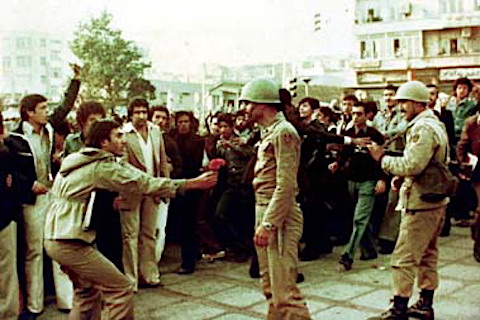Rethinking revolutions
 Photo/public domain
Photo/public domainA man holds a flower out to a soldier during the Iranian revolution in 1979.
Revolutions in the Middle East, Latin America and the Caribbean in the 20th century are often examined in comparison with revolutions in France or Russia. What if they were examined with greater focus on how they interacted with each other instead?
That’s the approach that Assistant Professor of History Gregory Childs and Charles Goodman Professor in Middle East History Naghmeh Sohrabi have taken with “Forgotten Dreams and Misplaced Revolutions,” a year-long John E. Sawyer Seminar on the Comparative Study of Culture.
“Forgotten Dreams and Misplaced Revolutions,” was borne out of lengthy conversations between Childs, a scholar of Latin American and Caribbean History, and Naghmeh Sohrabi, a scholar of modern Middle East history, about the similarities and differences between revolutions in Iran and Grenada that both occurred in 1979.
"We thought there might be a more fruitful and robust conversation if we thought about the way they talked to each other," Sohrabi said. "They were reading the same things but approaching revolution in very different ways."
The revolutions in Iran and Grenada were the starting point, and the seminar branched into the revolution in Nicaragua, also in 1979, along with earlier revolutions Bolivia and Algeria, both in the 1950s and 60s, and in Oman in the 60s and 70s.
The seminar included three public conversations with scholars and those involved in the revolutions, and seven sessions that more closely examine issues related to the revolutions. Childs and Sohrabi have brought together post-doctoral fellows Manijeh Moradian and Vivian Solana Moreno, along with 13 other seminar members and a variety of guests.
Although the revolutions in 1979 were carried out in very different ways, those involved were interacting with each other: They were reading the same texts, they were meeting on the ground in guerrilla camps, and from thousands of miles away they were monitoring each other through radio waves and speech transcripts.
For example, revolutionaries in Iran were keenly interested in the situation in Grenada to see if the United States would interfere, knowing this information could help them strategize. In Grenada, they were similarly keeping a close watch on what was happening in Iran. This interaction was examined during one of the seminar's public talks between Brian Meeks, a professor at Brown University and scholar on the Grenadian revolution, and Behrooz Ghamari-Tabrizi, a professor at University of Illinois, Urbana-Champaign.
“Putting them in context with big revolutions and marking them as failed, it actually silences a lot of the processes that happened on the ground,” Childs said. “Calling it a revolution forces a conversation about what progress is made, and progress for who?”
Sawyer Seminars, a program of the Andrew W. Mellon Foundation, provides support for comparative research on the historical and cultural sources of contemporary developments. The seminars effectively work as temporary research centers, providing funding and engaging scholars in a comparative inquiry over the course of a year that would be difficult to pursue. More information about “Forgotten Dreams and Misplaced Revolutions” can be found on its website.
Categories: Humanities and Social Sciences, Research





